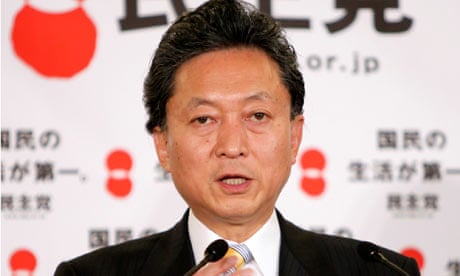Yukio Hatoyama, who is almost certain to become Japan's next prime minister, has had a hand in defeating the party that his family helped create.
His grandfather, Ichiro Hatoyama, was the Liberal Democratic party's first prime minister after its formation in 1955; today, Yukio Hatoyama is preparing to lead only the second non-LDP government for 54 years.
Like many senior Japanese politicians, Hatoyama has politics in his blood. His father, Iichiro, was a foreign minister and his younger brother, Kunio, recently served as a minister in Taro Aso's LDP government, which faces defeat today.
Today is not the first time Yukio Hatoyama has had a hand in ousting the LDP. Angered by its weak response to corruption scandals, he left the party in 1993 and helped form a coalition that kept the LDP in opposition, albeit for less than 11 months.
The 62-year-old's appointment in May as leader of the Democratic Party of Japan could not have been better timed, coming as Japan's main opposition emerged as a viable alternative to the LDP for the first time in the country's postwar history.
His election to the leadership was never seriously in doubt after Ichiro Ozawa, his mentor and fellow LDP rebel, stepped aside amid a funding scandal involving a senior aide.
Hatoyama's task since then has been to convince voters that his party, an eclectic bunch comprising former LDP rebels, conservatives and social democrats, is capable of guiding the world's second biggest economy through its worst economic crisis since the war.
Yet as a blue-blooded politician from a hugely wealthy family, Hatoyama can hardly claim to represent a fresh alternative to Japan's political modus operandi.
He inherited his father's LDP seat in Hokkaido, northern Japan, in 1986 and has since been elected seven times.
Hatoyama's personal ratings have not matched the high levels of support for his party. He can come across as eccentric and aloof – traits that have earned him the nickname "the alien" – and at times sounds more like the teacher he once was than a political leader.
In his first, three-year stint as DPJ leader from 1999, he was criticised for being indecisive.
While as an opposition leader he appears to have pulled off a landmark victory over one of the most formidable forces in modern political history, some have low expectations for Hatoyama as prime minister.
"He is a miserable candidate," Jeff Kingston, director of Asian studies at Temple University, told the Associated Press. "He is wooden, he is stiff, he can't improvise. His image is that he is not a very decisive leader, somebody who's not so charismatic, not so strong-willed."
Hatoyama studied engineering at Tokyo University – a breeding ground for generations of politicians and elite bureaucrats – before completing a PhD at Stanford. After a spell in teaching, he began his political career in 1983 when he became private secretary to his father.
